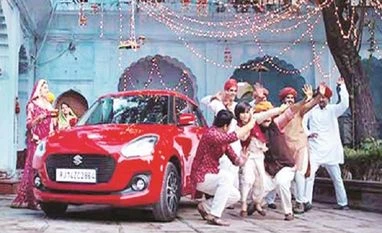Maruti Suzuki Chairman RC Bhargava believes that if a company wants to succeed, it must keep an ear to the ground and know what the consumer wants.
88-year-old Bhargava -- who at the helm of Maruti Suzuki helped make cars affordable for millions of middle class Indians -- has now appealed to the government to incentivise alternative technology for small cars. And, he is dead set against blindly replicating the western model.
But, why focus on small cars? After all, the market share of cars priced below 5 lakh rupees has shrunk from 25.8 per cent in FY19 to just 10.3 per cent in FY22. While the market for cars under 7.5 lakh rupees has shrunk from 60 per cent to 43 per cent over the same period. On the other hand, sales of pricier SUVs have been in the fast lane for some time now.
Undeterred, Bhargava says that sales of small cars priced below 7.5 lakh rupees will continue to grow for a long time to come. His rationale for the projection is that over 200 million two-wheeler customers are waiting to upgrade to cars. Also, Bhargava says that a substantial increase in the price of such small cars has forced thousands of would-be buyers to shelve their plans in recent times.
But, if India wants to meet its ambitious clean-mobility goals and 2070 emissions targets, the first car these 200 million customers buy can't be powered by internal-combustion engines.
Bhargava has the answer. There are two markets in India. There is what he calls the 'Bharat' market for affordable small cars and another one for bigger cars with 20-25 lakh rupees price tags. The challenge then is to meet the needs of the former because the current cost of electric cars would be double that of ICE cars.
An EV with a 12 lakh rupees tag would not be affordable for most middle-class buyers. Bhargava's solution is alternative technologies. At present, the price of a hybrid car is around 4 lakh rupees more than an ICE-only car. But, Bhargava says that a reduction in the Goods and Services Tax, as in the case of electric cars, would bring down their price to affordable levels.
While the cost of hybrids is higher than ICE cars, it is still lower compared to EVs. Also, Hybrids may be best suited for Indian conditions as they don’t require charging infrastructure. But, EVs attract a GST of 5 per cent, while hybrids attract a much higher 43 per cent GST.
India recorded sales of 115,032 hybrids in FY22, which is just 4.2 per cent of the 2.7 million passenger vehicles sold. Still, promoting hybrids might be the right solution for pushing EV adoption in India. Nomura Research Institute sees the share of hybrids in total PV sales doubling in FY25. In three or four years, they may become affordable, backed by Japanese carmakers. But, earlier attempts to popularise hybrids in India had failed in the absence of policy support and incentives. So, is GST rate parity between hybrids and EVs needed?
E[xpert byte]
Maruti Suzuki is not the only carmaker pitching for hybrids. Honda Cars India also says that lowering taxes on hybrids can speed up EV adoption in India. So, is this more of a strategy for Maruti to catch up with its peers in EV technology? Maruti Suzuki and Toyota have put their weight behind hybrid technology and even received a favourable market response. Unlike in the case of Mahindra & Mahindra and Tata, fully electric cars from Maruti and Toyota will not hit the market before 2025.
[Expert byte]
Hybrids appear to be a good stepping stone in India’s transition from ICE cars to EVs, especially till external charging infrastructure catches up. The ball is now in the government’s court.
)